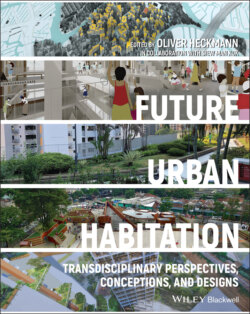Читать книгу Future Urban Habitation - Группа авторов - Страница 25
Care for the Elderly and Dependent Population
ОглавлениеAccording to the city's socio‐demographic survey in 2017, in Barcelona there would be 117 000 people with a significant lack of personal autonomy who would need help to carry out everyday activities. We are referring to people who suffer from a specific illness, those who have some type of disability, and senior citizens who have lost personal autonomy due to the ageing process. Approximately half of these people would need regular help.
Administrative records indicate that 67 000 people are recognized by Act 39/2006 on the promotion of personal autonomy and care for dependent persons as having a degree of dependence or, where they do not have this, receiving the city's municipal Home Care Service (in Catalan Servei d’Atenció Domiciliària, SAD); 85% of them are 65 years old or over. The SAD is a Barcelona City Council service that provides personal care and, in certain cases, support for cleaning and maintaining the home, for people who find it difficult to carry out everyday activities, who have difficulties with social integration or who lack personal autonomy. The service is mainly provided in people's own homes, although it may also involve accompanying the person when they leave their home for some purpose. This is not a universal service; it involves prior professional evaluation by Social Services Centres. The SAD has nearly 19 000 users. Around 77% of them are senior citizens over the age of 75 (BCNEcologia 2019), and it is estimated that in 10 years’ time, this group will have increased by 11%.
In the last decade, the SAD has grown exponentially, with the introduction of the above‐mentioned Act. The service is provided by three private companies through 4000 professional staff. It involves the provision of 4.5 million working hours a year, with a total cost to the City Council of over €80 million (it is the second‐largest public contract in terms of expenditure). Today it is an extremely feminized service (90% of the professional staff are women) and it has notable levels of precariousness: 71% of them are part‐time workers, as it is very difficult to plan a full day's work, given that most of the care work is carried out in the mornings, and the wages are most commonly between €600 and €800 a month, which is in no way enough to live in a city like Barcelona. Furthermore, this type of work does not usually receive social recognition, although it certainly deserves it. The work is varied and less structured than the work carried out in elderly care homes. It requires flexibility and adaptability, and needs specific skills for working in the intimate space of the person concerned and dealing with complex situations (e.g. moving bodies with reduced mobility or coping with behaviours associated with psychological disorders or fragile mental health); it is a rather solitary job that involves inefficient journeys between people's homes, which has negative effects on the worker's health (GESOP 2017). The COVID‐19 situation has shown more clearly how significant this work is, as well as the need for giving it adequate recognition and reducing precariousness.
Another institutionalized way of providing care for elderly people in their homes is a financial benefit that provides support for non‐professional caregivers. In other words, someone with a recognized degree of dependence according to Act 39/2006 can apply for this benefit if the person caring for them is a member of their family circle that lives with them; this person is a non‐professional caregivers who, during the last year, has dedicated a large proportion of their time to carrying out these care tasks.1 At present, another 15 000 people in the city receive this benefit, which is a responsibility of the regional government.
In addition to these services, there are a large number of formal and informal services that are outside the care work financed using public funds and which unfortunately lie outside our exhaustive knowledge. We refer to the care work carried out by a dependent person's relatives or people from their close circle (without any pay or the support of any benefits). We are also referring to paid care work that is directly provided by the market, through companies or even directly by a non‐professional caregiver (often without an employment contract). In all of these cases, there is still a significant gender bias, because women essentially carry out this work. Outside the family circle, there are also still racial divisions (Carrasco et al. 2011). This is a situation of inequality that is not always recognized and the feminism movement is calling for structural measures to promote equality in care work.
In some cases, this care work complements public services. According to a survey carried out by the City Council of 600 dependent people (as yet unpublished), it can be seen that those who state that they feel well cared for receive an average of 17 hours of care every working day. Taking into account that the SAD provides its users with an average of only one hour of service per working day, the role of non‐professional caregivers is vital for achieving these levels of satisfaction, something that also reveals a situation of deep inequality. The City Council contributes to the support of these people with its Respir and Respir Plus programmes, where up to 1000 families receive financial aid in order to temporarily place their dependent relatives in elderly care homes, and Barcelona Cuida, a new facility as part of a support strategy for non‐professional caregivers (Ajuntament de Barcelona 2017, 2019a).
